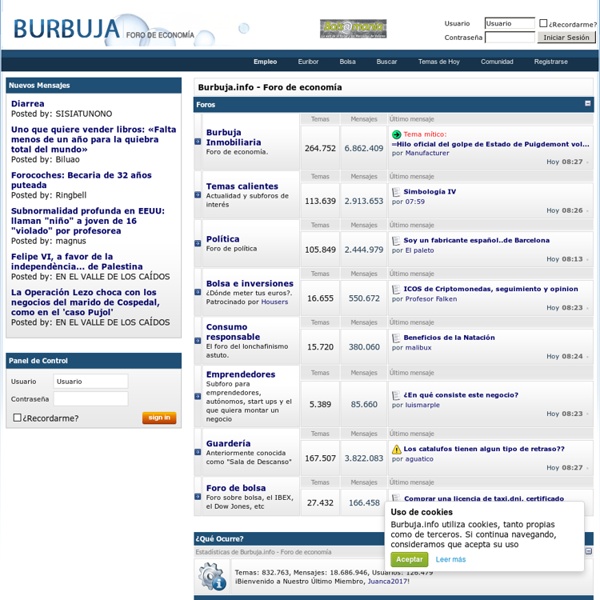



RESCATE DE ESPAÑA: LA TRAVESIA DEL DESIERTO HA COMENZADO (V) Anguita en El Econ que buscar cuál es el denominador común de tantas personas y el fin es un programa. Que la gente lo discuta, yo ya he lanzado diez propuestas como es el salario mínimo de 1.000 euros, pensiones mínimas de 1.000 euros, la cuestión de la reforma fiscal o la nacionalización de la banca y sectores estratégicos", entre otras, ha referido Anguita. Claro que sí hombre. 1.000 euros. Pero los pisitos y los terruñitos, esos ni tocarlos. Dedos everywhere, everywhere. [me gustaría un emoticono de "señor ven y llévame pronto"] Rosa Díez y su (ya que lo dirige con puño de hierro según parece) UPyD se pueden ir yendo a la mismísima mierda. Rosa Díez solo está intentando pescar en río revuelto. Ahora bien, Rosa Díez no es UPyD. JC10 sería como Almirante, Senescal y General Supremo de los ejércitos Mamporreros. Ahí, ahí.
Conexiones improbables: Un artista como asesor de tu empresa Tags: Buenas IdeasConexiones ImprobablesFagorPaola TognazziPKMN No lo ves, pero está ahí. A tu lado. Tu alrededor está invadido. Aunque ni siquiera lo intuyas. Todo lo que te rodea está tomado por lo insólito, por la novedad, por lo desconocido. Es así como la humanidad ha ido inventando este planeta. Es, a menudo, en la unión de cabos que nunca nadie hubiese atado donde reside el éxito. Esas otras realidades son las que busca cada día Conexiones improbables. “Hacemos proyectos de innovación, transformación demostrativa y descubrimos nuevos modelos organizativos para la fabricación de productos o la oferta de servicios”, explica Roberto Gómez de la Iglesia, fundador de Conexiones improbables. El artista, en esta ocasión, deja en casa su faceta de expresión personal. “El artista no actúa como consultor creativo. Conexiones improbables se fijó en la mirada del arte, frente a la figura del consultor convencional, porque “un artista es alguien que hace un uso diferente de la información.
la enciclopedia libre Historias de España El dinero ya no es lo que era Tags: BitcoindineroP2P Algo le está pasando al dinero. No puede ser la misma cosa la que se evapora por miles de millones al dia según cuentan nuestros periódicos y la que falta, en la humilde forma de moneda, en los bolsillos de tantos. No puede tener la misma naturaleza aquella que facilita el intercambio real de bienes y servicios entre países -el 2% de todas las transacciones en divisas- y aquel otro 98% (casi ;) que especula con las variaciones de tipos de cambio… entre dineros. Decadente. Desde que en 1971 se convino que ya no estaría respaldado por el oro –por nada físico- éste no ha parado de multiplicarse. A la vez y por suerte hay cada vez más cosas de las que ahora importan para las que no hace falta tanto dinero como antes, y para algunas, ninguno. El dinero está en crisis. Confiamos más los unos en los otros que lo que nuestras instituciones confían en nosotros. Javi Creus es fundador de Ideas for Change Foto: Pen Waggener bajo licencia Creative Commons ¡Ahora hacemos libros!
Menéame Blog de Rankia "Estrategias de inversión 2014" con Abante Asesores en Málaga, 6 de Mayo El martes 6 de Mayo a las 18:00 horas en Málaga tendrá lugar la conferencia "Estrategias de inversión 2014" con los gestores de Abante Asesores, en colaboración con Rankia. En la ponencia, los gestores de fondos de inversión de Abante: José Ramón Iturriaga y Josep Prats nos mostrarán su visión de mercados y las estrategias de inversión que tienen proyectadas para este año 2014. Leer más ¿Dónde vemos oportunidades de inversión? 2014 está siendo un año de gran volatilidad en los mercados y por ello queremos conocer qué perspectivas tienen las grandes gestoras de fondos de inversión para este año y en qué mercados están invirtiendo. Para ello, el miércoles 7 de Mayo trataremos de dar respuesta a la pregunta ¿Dónde vemos oportunidades de inversión? Fecha: miércoles 7 de Mayo 2014 Hora: 18:00 horas Lugar: Borsa de Barcelona - Passeig de Gràcia, 19 Acceso: Gratuito Fecha: miércoles 2 de Abril 2014 ¡Hasta el año que viene!
Cuatro claves para entender el futuro del marketing online El marketing online está revolucionando la forma en que se comercializan productos y servicios, eso ya lo sabemos. Pero, ¿cómo evolucionará de aquí en adelante? Compras con dispositivos móviles, ubicuidad, nuevos sistemas de medición y mayor volumen de información serán algunos de los factores que definirán el futuro del consumo a través de la web. - Las tiendas virtuales tendrán tanto alcance como las tiendas físicas Así como en los últimos tiempos cambiaron las formas de comunicarse o de trabajar, la experiencia de compra también está cambiando. Otras de las claves está en el Social Shopping. - Los consumidores comprarán cada vez más desde su móvil El Social Shopping se convertirá además en Mobile Shopping. - El análisis de la Big Data reemplazará a la estadística tradicional La forma de obtener información también se está modificando radicalmente a partir del auge de las redes sociales y del contenido generado por los usuarios. La evolución de Internet es constante. Edición Kindle: